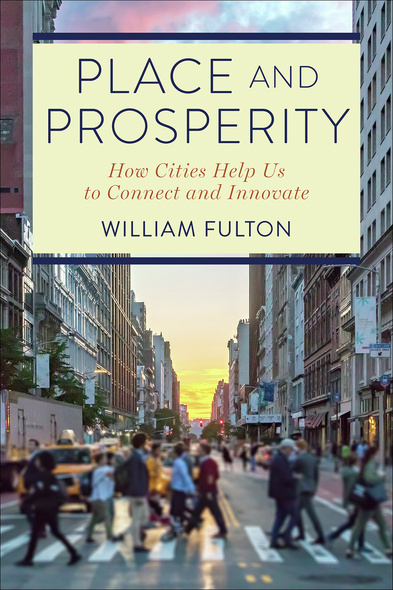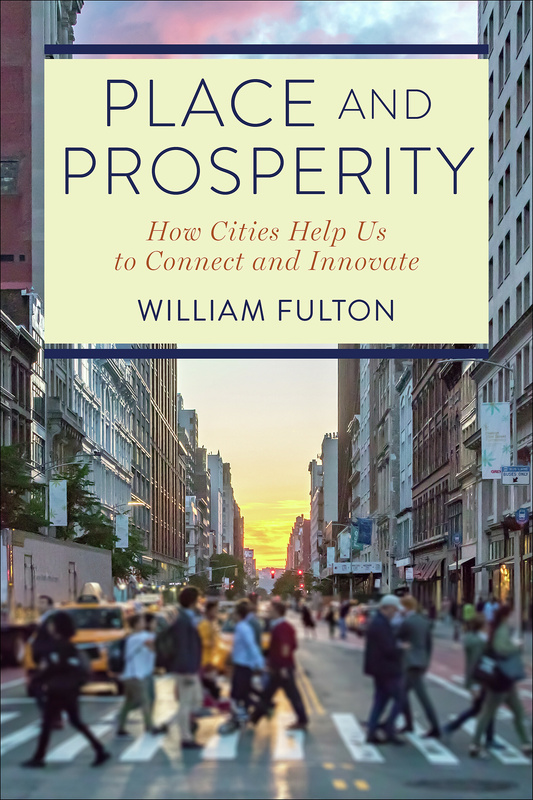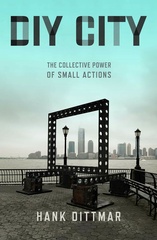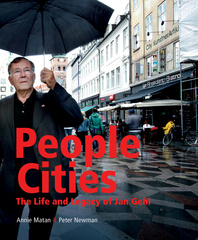
216 pages, 6 x 9
15 photos and illustrations
Paperback
Release Date:21 Jul 2022
ISBN:9781642832501
There are few more powerful questions than, “Where are you from” or “Where do you live?” People feel intensely connected to cities as places and to other people who feel that same connection. In order to understand place – and understand human settlements generally – it is important to understand that places are not created by accident. They are created in order to further a political or economic agenda. Better cities emerge when the people who shape them think more broadly and consciously about the places they are creating. In Place and Prosperity: How Cities Help Us to Connect and Innovate, urban planning expert William Fulton takes an engaging look at the process by which these decisions about places are made, how cities are engines of prosperity, and how place and prosperity are deeply intertwined. Fulton has been writing about cities over his forty-year career that includes working as a journalist, professor, mayor, planning director, and the director of an urban think tank in one of America’s great cities. Place and Prosperity is a curated collection of his writings with new and updated selections and framing material.
Though the essays in Place and Prosperity are in some ways personal, drawing on Fulton’s experience in learning and writing about cities, their primary purpose is to show how these two ideas – place and prosperity – lie at the heart of what a city is and, by extension, what our society is all about. Fulton shows how, over time, a successful place creates enduring economic assets that don’t go away and lay the groundwork for prosperity in the future. But for urbanism to succeed, all of us have to participate in making cities great places for everybody. Because cities, imposing though they may be as physical environments, don’t work without us.
Cities are resilient. They’ve been buffeted over the decades by White flight, decay, urban renewal, unequal investment, increasingly extreme weather events, and now the worst pandemic in a century, and they’re still going strong. Fulton shows that at their best, cities not only inspire and uplift us, but they make our daily life more convenient, more fulfilling – and more prosperous.
Though the essays in Place and Prosperity are in some ways personal, drawing on Fulton’s experience in learning and writing about cities, their primary purpose is to show how these two ideas – place and prosperity – lie at the heart of what a city is and, by extension, what our society is all about. Fulton shows how, over time, a successful place creates enduring economic assets that don’t go away and lay the groundwork for prosperity in the future. But for urbanism to succeed, all of us have to participate in making cities great places for everybody. Because cities, imposing though they may be as physical environments, don’t work without us.
Cities are resilient. They’ve been buffeted over the decades by White flight, decay, urban renewal, unequal investment, increasingly extreme weather events, and now the worst pandemic in a century, and they’re still going strong. Fulton shows that at their best, cities not only inspire and uplift us, but they make our daily life more convenient, more fulfilling – and more prosperous.
It’s the subtle relationship between wealth and sense of place that has long fascinated William Fulton, who comes as close to being an urban renaissance man as anyone in my experience....Now he has written a book that outlines his urban vision in what amounts to a simple equation: Place plus prosperity equals a successful community. One without the other makes a community that has failed to achieve its highest purpose.
Place and Prosperity is a thought-provoking resource for practicing planners and academics alike. Fulton utilizes experiences throughout his career and life and relates them to development trends in various cities throughout the U.S. The book contains innovative suggestions ranging from making cities less reliant on personal automobiles to introducing middle housing into suburban commercial and office centers.’
Place and Prosperity reminds me of Bill Fulton himself: straight-forward and interestingly nuanced, deeply insightful and provocatively contrarian, sometimes skeptical and always hopeful. Fulton's gift is that he understands people and therefore understands cities. He connects the quest for prosperity, peace, and freedom in our society to the quality of life in our urban places. This book is actually a chronicle of his life envisioning livable communities in order to create better chances in life for everyone.
In his new collection of essays, Bill Fulton gives readers new to urbanism a set of magic goggles for reading places and understanding why they like some, and not others. For practitioners like me, he reminds us of how economic development should be thought of as a chance to co-invest in making the city, large or small, a greater physical place – creating a park, widening sidewalks, developing a key transit site to better connect to surrounding neighborhoods. Companies may come and go, but great cities are beloved places of enduring value.
This book is both Fulton’s Bildungsroman—tracing the arc of his intellectual development—and the chronicle of the great urban comeback of America’s cities. Fulton is the only urban thinker of our time who combines the sharp eye of a journalist, the objective rigor of an academic, and the practical experience of a leader.
William Fulton is one of America’s most established thought leaders in the field of urban planning. Hs currently serves as a Senior Advisor to PFM Management and Budget Consulting and a Fellow at the Terner Center for Housing Innovation at UC Berkeley. From 2014 to 2022, he served as the director of Rice University's Kinder Institute for Urban Research. He is a former Mayor of Ventura, California, and Director of Planning and Economic Development for the city of San Diego. His previous books include Guide to California Planning, the standard urban planning textbook in California, The Reluctant Metropolis: The Politics of Urban Growth in Los Angeles, which was an L.A. Times best-seller, and The Regional City: Planning for the End of Sprawl (with Peter Calthorpe). Fulton holds master’s degrees in mass communication from The American University and urban planning from the University of California, Los Angeles.
Foreword by Rick Cole
Preface
Introduction
Part 1: Place
1. The Making of an Urbanist
2. The Thinning Metropolis
3. The Garden Suburb and the New Urbanism
4. The Autocratic Citizen of Philadelphia
5. Having No Car but Plenty of Cars
6. Tom Hayden’s Cars
7. Talk City
8. Why I’m Scared to Walk in Houston
9. My Favorite Street
Part 2: Prosperity
10. Romancing the Smokestack
11. Company Town
12. The Case for Subsidizing the Mermaid Bar
13. Kotkin versus Florida
14. Houston, We Have a Gentrification Problem
Part 3: The Promised Land
15. The Long Drive
16. The California Attitude
17. The Not-So-Reluctant Metropolis
18. Living the 2 Percent Life
19. My Los Angeles
Conclusion: On the Morning after the Pandemic
Acknowledgments
Credits
About the Author
Index
Preface
Introduction
Part 1: Place
1. The Making of an Urbanist
2. The Thinning Metropolis
3. The Garden Suburb and the New Urbanism
4. The Autocratic Citizen of Philadelphia
5. Having No Car but Plenty of Cars
6. Tom Hayden’s Cars
7. Talk City
8. Why I’m Scared to Walk in Houston
9. My Favorite Street
Part 2: Prosperity
10. Romancing the Smokestack
11. Company Town
12. The Case for Subsidizing the Mermaid Bar
13. Kotkin versus Florida
14. Houston, We Have a Gentrification Problem
Part 3: The Promised Land
15. The Long Drive
16. The California Attitude
17. The Not-So-Reluctant Metropolis
18. Living the 2 Percent Life
19. My Los Angeles
Conclusion: On the Morning after the Pandemic
Acknowledgments
Credits
About the Author
Index






